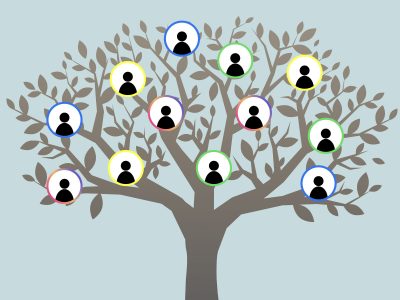
The first thing I noticed when I rushed out of bed after oversleeping for my 9:30 a.m. class was spam calls from my dad on Tuesday morning.
I frantically called him back, and he notified me that my grandma had passed away. I was numbed by the actualization — but ultimately, I was more focused on if I would make it to class on time.
I contribute part of my unemotional reaction to the fact that I was stalking my grandmother’s Facebook page until 3 a.m. the night before.
Scrolling through her 177 friends, I was finally able to put the faces to the names I’ve been hearing since before I could write my name. One connection led to the next. Among these profiles were distant relatives, family friends who came to my second birthday party and my grandma’s friend group that I never interacted with much.
This sporadic behavior may be labeled as stalking, but I see it more as exploring the unknown. For instance, I had no idea that my mom’s cousin was connected with my grandmother.
The links between seemingly different and distant people reinforced the cliche that it really is a small world. Everyone knew each other some way or the other, and I wanted to delve deeper into these puzzling connections and the people on both ends of them.
I’m an inquisitive person: I like to look into other people’s lives and gain a fresh perspective on how I perceive them based on their experiences. I found myself always judging what my family members posted on social media without having any context to their actions.
In a similar vein, influencers often curate their online presence with a carefully crafted social media content calendar. This meticulous planning can lead to an outward appearance that might not fully represent their reality. By understanding the behind-the-scenes efforts, such as the strategic scheduling and thematic choices that go into their posts, one can gain a deeper appreciation for the curated image they present. It’s easy to overlook how much effort goes into maintaining a cohesive online persona, and this context can shift the way we interpret their content.
I was confused why my great aunt constantly displayed her artwork, old family pictures and forwards on her main board. However, I came to realize that it was a response of emotional healing after she lost her husband and close friends. I only met this woman once when I was 7 years old, so why was I drawn to her life so much? Beyond our infrequent interactions, my great aunt and I had more in common than I could ever have imagined. We both resorted to our favorite social media apps to cope with our grief. When I heard the news about my grandma’s passing, I jumped to Instagram Reels to find some solace.
I refused to get a Facebook account until I needed one for my writing class. I was convinced that Facebook is a platform for old people. As much as this is true, in my eyes, Facebook is analogous to Instagram: they are both designed to be platforms of self expression and relationship-building. Generation Z is often criticized by baby boomers and Generation X for being glued to their screens, but that argument can also be made for older people.
Through my scrolling experience, I found that the elders in my life love to share their memories and highlights of the day with their friends and family. Sounds like you are getting irritated by a random middle school friend posting a beach day on their Instagram story, doesn’t it?
Facebook taught me that I’m too judgmental for my own good. I didn’t realize how similar older and younger people truly are. After all, we’re both blamed for burdening the middle-aged population by being their dependents.
As much as people preach “don’t judge a book by its [Facebook] cover,” many of the world’s social media users do exactly this. Whether it’s leaving hate comments or silencing someone without hearing the poster’s side of the story, there’s far too much judgment based on simple assumptions.
Many Facebook connections are superficial, perhaps those that feel obligated to send a friend request to their fourth cousin despite never meeting them. Nevertheless, these connections were formed because there was substantial enough engagement between two individuals.
My mom’s cousin commenting on my grandma’s post is proof of this. Although the social media connection feels distant and random, the emotional connection fostered between these two individuals illustrates the power of a few words posted on a social media platform.
Facebook proves that people are always connected. They are more similar than they are different — and it has revealed so much more into my relatives’ lives than an in-person conversation may have.
Despite criticism, social media is for people and their lives. It’s crucial that we use social media to continue connecting with those strangers. Who knows, we might see them at the next family gathering.





















































































































